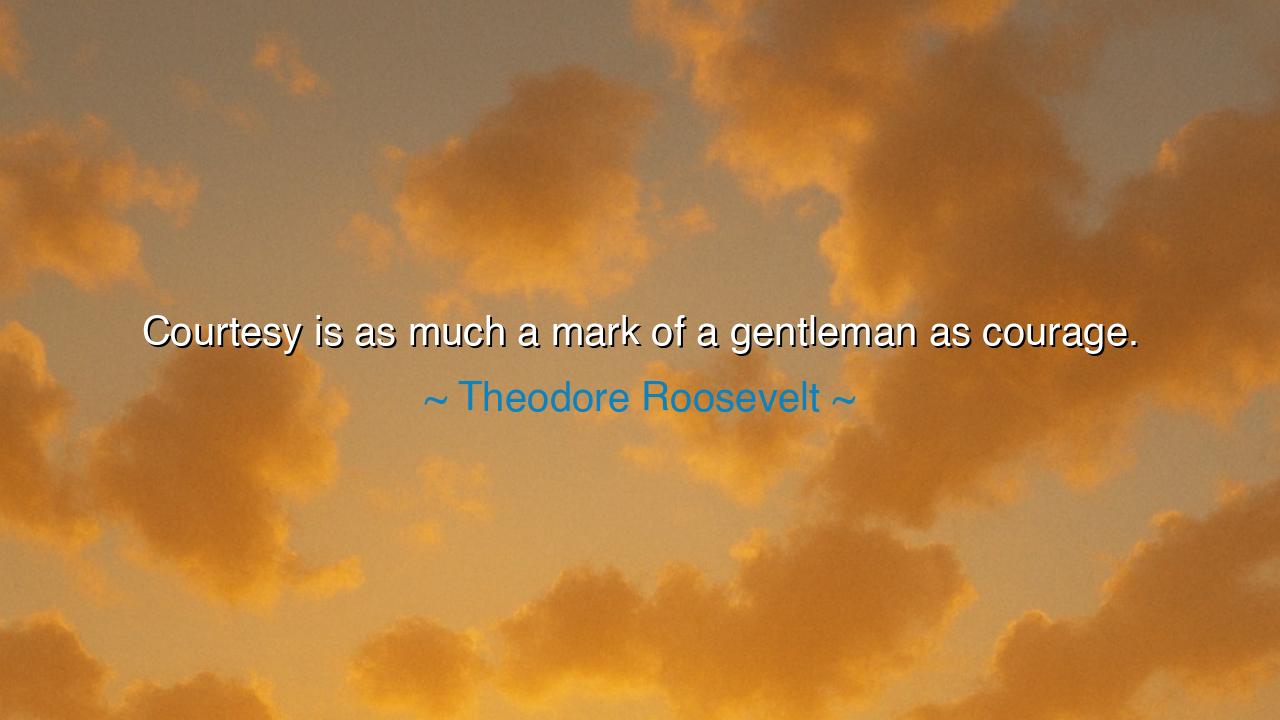
Courtesy is as much a mark of a gentleman as courage.






The great statesman and warrior of character, Theodore Roosevelt, once declared: “Courtesy is as much a mark of a gentleman as courage.” In this brief but shining phrase, he revealed one of the deepest truths of noble living — that strength alone does not make a man great, and that power without grace is but savagery in disguise. Roosevelt, who charged up the hills of San Juan with sword in hand and yet spoke gently to his adversaries, knew that the measure of a true gentleman is not found only in the boldness of his deeds, but in the kindness of his manners. Courage may win battles, but courtesy wins hearts — and together they form the twin pillars of greatness.
This wisdom came from a man who lived at the meeting point of action and thought. Theodore Roosevelt was both a soldier and a scholar, a hunter and a poet, a man of fierce energy tempered by deep civility. He understood that while courage is the fire that burns in the breast of the brave, courtesy is the light that shines from the soul of the good. It is easy to act with boldness; it is far harder to act with gentleness when one holds power. Thus, Roosevelt taught that the true gentleman — and indeed, the true leader — must possess both. For courage without courtesy becomes arrogance, and courtesy without courage becomes weakness.
To understand the fullness of his words, one must remember the world from which they arose. Roosevelt lived in an age of conquest, when men glorified strength and ambition. Yet even in such a time, he saw that virtue was not measured by dominance, but by restraint. The wild horse is strong, but it is the tamed horse — disciplined, controlled, and responsive — that serves nobly. So too is it with man. Courtesy is the self-mastery of the spirit, the ability to show respect even when emotion burns hot, to speak kindly even to those who oppose you, and to honor the dignity of others regardless of station or strength. It is the refinement of courage — the proof that one’s bravery springs from character, not pride.
History is filled with those who embodied this balance of courage and courtesy. Consider George Washington, who led armies through war and governed a nation through peace. His courage on the battlefield earned freedom for his people, but it was his courtesy — his humility in stepping away from power when he could have claimed a throne — that made him immortal in the hearts of men. Likewise, Mahatma Gandhi, though frail in body, wielded the courage of an empire and the courtesy of a saint. His strength lay not in violence, but in the moral power of gentleness. Both men proved that true greatness does not roar; it listens, respects, and acts with calm resolve.
To practice courtesy, then, is not weakness, but wisdom. It is the art of making others feel valued, even when you hold the advantage. It requires restraint — the same kind of restraint that the warrior shows when he sheaths his sword, knowing he could strike but chooses not to. The brave man faces his enemies without fear; the courteous man faces his fellow humans without contempt. One defends life, the other dignifies it. Together, they form the complete image of what it means to be truly noble.
But let none mistake courtesy for mere politeness or empty decorum. It is not the hollow civility of social grace, but the living expression of respect and self-command. It is born of empathy — the ability to see in others the same humanity that lives in oneself. It is forged in humility — the awareness that strength does not make one superior, but responsible. When a man treats even his inferiors with kindness, when he listens before he judges, when he offers patience instead of scorn — then he proves his mastery not only over the world, but over his own heart.
So, my child, remember Roosevelt’s teaching: to be brave is noble, but to be courteous is divine. The world honors the warrior who conquers others, but it reveres the gentleman who conquers himself. Cultivate both courage and courtesy, and you will walk among men as one who commands without cruelty and leads without pride. Speak gently even when you stand firm; show respect even when you are opposed. For in a world that celebrates power, kindness remains the rarest and most enduring form of strength. And when your days are done, it will not be your victories that are remembered, but the grace with which you lived them.






AAdministratorAdministrator
Welcome, honored guests. Please leave a comment, we will respond soon